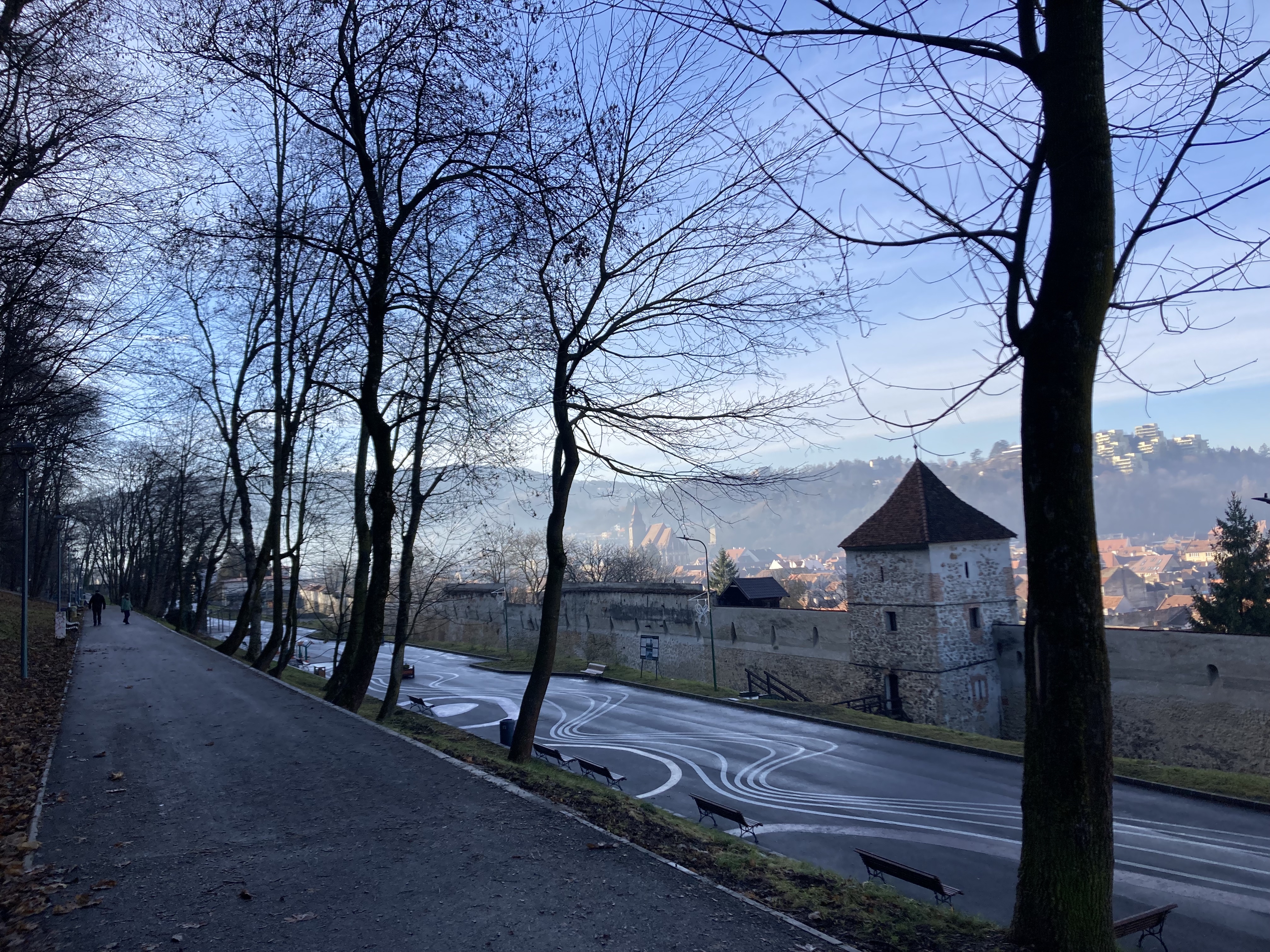Books, Articles and other media I enjoyed in 2022
 Source: Catalin Avram - photo taken in lovely Brașov, Romania, Dec 31, 2022
Source: Catalin Avram - photo taken in lovely Brașov, Romania, Dec 31, 2022
Intro
Keeping up with the yearly tradition, here is a list of books, articles and other media I have found interesting this year.
This year the list will be shorter, not because I have not consumed enough books and other media, but because I want to highlight the ones that really inspired me.
Another side note to mention is that some of the content I consume is in Romanian, French or German - languages I can read or speak to a certain degree. For that content I have decided to write a review in that particular language because I feel it’s more appropriate. So here we go :)
Gödel, Escher, Bach: an Eternal Golden Braid
This book is hard to categorize. In the introduction, the author himself prides that his book can be found on different shelves in different libraries: Math, Computer Science, Philosophy, Music, Art, Political Science, just to name a few…
It is a journey into the rabbit hole of AI, Music and Logic/Math, narrated in Lewis Carroll style. The book goes VERY deep in subjects such as Artificial Intelligence, Mathematical truths and Music.
It is a journey into the beauty of music, mathematics and art - and how they relate.
Kurt Gödel was a logician, mathematician and philosopher. There are books written on his life and genius, but he is basically responsible for saying (or rather proving) that Math and Logic are incomplete (source)
M. C. Escher was a Dutch graphic artist who made mathematically inspired woodcuts, lithographs, and mezzotints. He is most famous for creating impossible drawings. The genius of his drawings is not necessarily that they are “impossible”, these types of paradoxes have been done before in art, but that they are looping back on themselves. This is the connection between Escher and the other two protagonists of this book.

Source: Wikipedia (https://en.wikipedia.org/wiki/Waterfall_%28M._C._Escher%29)
Johann Sebastian Bach was a German composer and musician of the late Baroque period. Bach’s discography (hah!) is large, but the book focuses on a particular piece of work, called “Musical Offering”. The musical offering is written as a “Crab Canon”, which is a special arrangement of two musical lines that are complementary and backward. In a particular arrangement, this technique would result in something similar to a Palindrome. And here we are back to the looping paradox which can be seen in both Gödel’s work and Escher’s.
This book is very fun to read, but not easy and the content is very dense. It took me a while to get through it and I feel I need to read it another 3-4 times to understand more.
Mircea Eliade - Făurari și Alchemiști 🇷🇴
Am început din nou să citesc în romănește. Am mai făcut-o în trecut, dar în ultimul an mi-am dat silința să citesc scrieri mai complicate. Una dintre cărțile pe care le-am citit m-a influențat foarte mult.
Este greu de simplificat și de a face comentariu unei cărți scrise de Mircea Eliade în câteva rânduri, dar vreau să vă spun că aceasta carte mi-a stârnit un set de emoții pe care nu le mai simțisem de mult. Deși cartea în sine vorbește despre filosofie și religie, eu mi-am regăsit munca și craftul în acele idei.
În munca de software engineer pe care o fac zilnic, sunt tot timpul prins intre abstract (teoria computației și cum funcționează un computer la nivel de atomi) și concretul - care în linia mea de munca înseamnă “ce tehnologie, adică framework, limbaj de programare, etc să mai învăț că să pot să-mi fac jobu mai eficient”. Am să mai vorbesc despre asta în alt articol.
Nassim Nicholas Taleb - The Black Swan
I ran across Taleb’s work while researching how Machine Learning and other AI/Learning techniques are currently used in Finance. After reading this book, I ended up reading his entire series “Fooled By Randomness” series (of which this book belongs to).
The main idea of the book is that there’s a long tail (as in Bell curve tail) where most analysts don’t pay attention to and where interesting things happen. A Black Swan event is a highly improbable event that happens once in a while and that is not taken into account. For example, the financial crisis from 2008 was a Black Swan event because nobody saw it coming (or at least nobody), but the 2020 COVID crisis is NOT considered a Black Swan event, because we do expect epidemics to happen once in a while.
I try to apply the learnings from this book to software engineering so I can build better, more robust systems. A more detailed post regarding this is in the making!
The Disordered Cosmos - Chanda Prescont-Weinstein
Wanted to get back into Astronomy and Cosmology so I picked up Chanda’s The Disordered Cosmos. Chanda goes into deep theories of physics from a different perspective than what I’m used to, but a very familiar one. She points out how the academic and science community is generally flawed and biased towards white males - this is a bigger topic that is not relevant only to Cosmology, but most other areas and industries.
The very interesting point of view of this book is the general idea that we seem to be so cocky of our current knowledge of space, math and physics that we disregard ancient wisdom as something being irrelevant. She argues, and I agree with this, that ancient wisdom is still very much relevant today and mostly ignored or forgotten.
On the measure of intelligence by François Chollet
This is a paper written by Francois Chollet, an AI researcher who created the Keras ML framework. It is a great start to a discussion on what intelligence means in terms of AI and AGI. The claim is that humans can infer patterns with very little data, and machines cannot do that yet with our current techniques.
He created the Abstraction and Reasoning Corpus (ARC) - a set of challenges which are relatively easy for humans to solve, but almost impossible for the current, state of the art AI/Machine Learning systems.
Someone else created a game based on this corpus, you can give it a try (source)